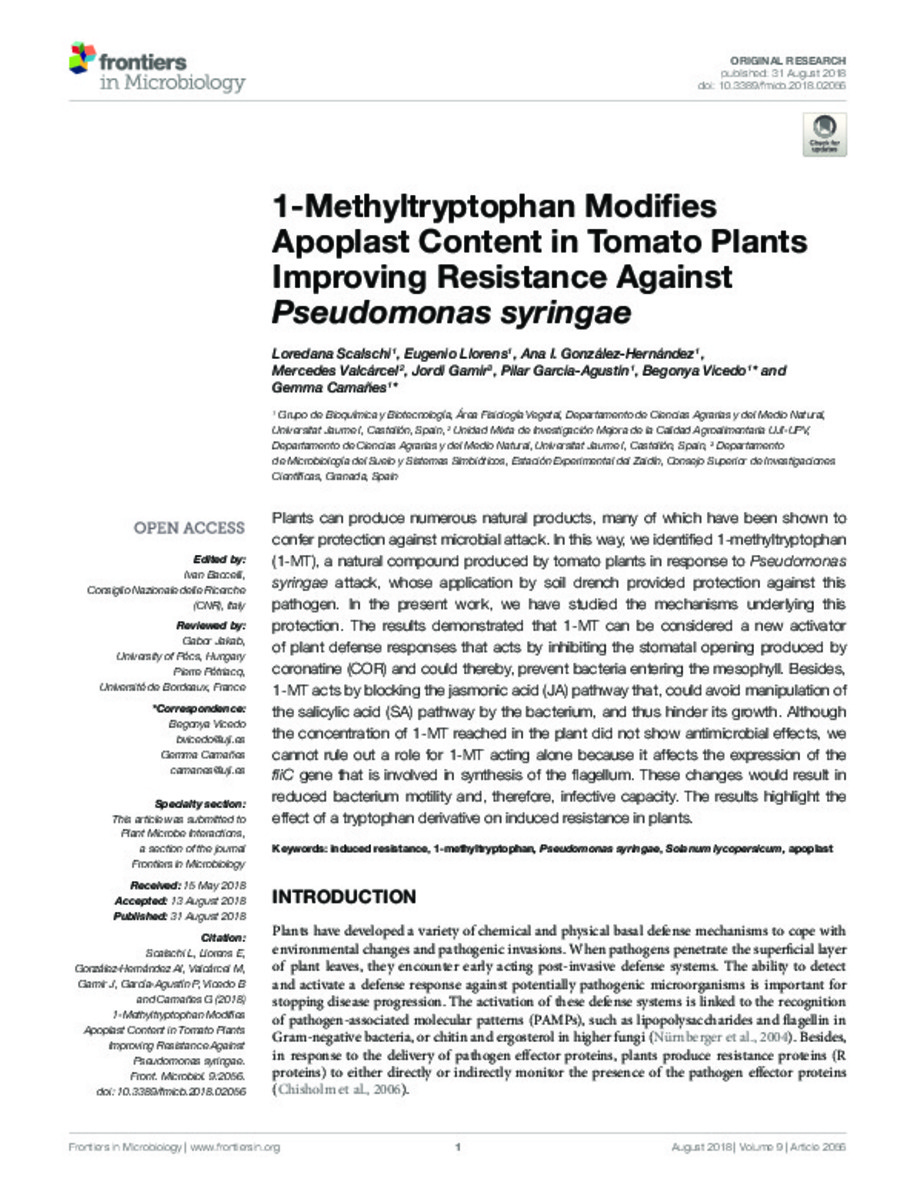Mostrar el registro sencillo del ítem
1-Methyltryptophan Modifies Apoplast Content in Tomato Plants Improving Resistance Against Pseudomonas syringae
| dc.contributor.author | Scalschi, Loredana | |
| dc.contributor.author | Llorens, Eugenio | |
| dc.contributor.author | González-Hernández, Ana I. | |
| dc.contributor.author | Valcárcel, Mercedes | |
| dc.contributor.author | Gamir, Jordi | |
| dc.contributor.author | García Agustín, Pilar | |
| dc.contributor.author | Vicedo, Begonya | |
| dc.contributor.author | Camañes, Gemma | |
| dc.date.accessioned | 2018-10-16T11:14:54Z | |
| dc.date.available | 2018-10-16T11:14:54Z | |
| dc.date.issued | 2018-08-31 | |
| dc.identifier.citation | SCALSCHI, Loredana Maria; LLORENS, Eugenio; GONZÁLEZ HERNÁNDEZ, Ana Isabel; VALCÁRCEL GERMES, Mercedes; GAMIR, Jordi; GARCÍA AGUSTÍN, Pilar; VICEDO JOVER, Begonya; CAMAÑES QUEROL, Gemma (2018). 1-Methyltryptophan Modifies Apoplast Content in Tomato Plants Improving Resistance Against Pseudomonas syringae. Frontiers in Microbiology, v. 9 | ca_CA |
| dc.identifier.uri | http://hdl.handle.net/10234/176789 | |
| dc.description.abstract | Plants can produce numerous natural products, many of which have been shown to confer protection against microbial attack. In this way, we identified 1-methyltryptophan (1-MT), a natural compound produced by tomato plants in response to Pseudomonas syringae attack, whose application by soil drench provided protection against this pathogen. In the present work, we have studied the mechanisms underlying this protection. The results demonstrated that 1-MT can be considered a new activator of plant defense responses that acts by inhibiting the stomatal opening produced by coronatine (COR) and could thereby, prevent bacteria entering the mesophyll. Besides, 1-MT acts by blocking the jasmonic acid (JA) pathway that, could avoid manipulation of the salicylic acid (SA) pathway by the bacterium, and thus hinder its growth. Although the concentration of 1-MT reached in the plant did not show antimicrobial effects, we cannot rule out a role for 1-MT acting alone because it affects the expression of the fliC gene that is involved in synthesis of the flagellum. These changes would result in reduced bacterium motility and, therefore, infective capacity. The results highlight the effect of a tryptophan derivative on induced resistance in plants. | ca_CA |
| dc.format.extent | 12 p. | ca_CA |
| dc.format.mimetype | application/pdf | ca_CA |
| dc.language.iso | eng | ca_CA |
| dc.publisher | Frontiers Media | ca_CA |
| dc.relation.isPartOf | Frontiers in Microbiology (2018), v. 9 | ca_CA |
| dc.rights | Atribución 4.0 Internacional | * |
| dc.rights.uri | http://creativecommons.org/licenses/by-sa/4.0/ | * |
| dc.subject | Induced resistance | ca_CA |
| dc.subject | 1-methyltryptophan | ca_CA |
| dc.subject | Pseudomonas syringae | ca_CA |
| dc.subject | Solanum lycopersicum | ca_CA |
| dc.subject | Apoplast | ca_CA |
| dc.title | 1-Methyltryptophan Modifies Apoplast Content in Tomato Plants Improving Resistance Against Pseudomonas syringae | ca_CA |
| dc.type | info:eu-repo/semantics/article | ca_CA |
| dc.identifier.doi | https://doi.org/10.3389/fmicb.2018.02056 | |
| dc.relation.projectID | 1) Spanish Ministry of Science and Innovation (AGL2013-49023-C03-02-R); 2) Pla de Promoció de la Investigació of Universitat Jaume I (P1 · 1B2013-75, UJI-A2016-09, and UJI-B2017-30); 3) Research Staff Training grant of AG-H (PREDOC/2016/27) of Universitat Jaume I. | ca_CA |
| dc.rights.accessRights | info:eu-repo/semantics/openAccess | ca_CA |
| dc.relation.publisherVersion | https://www.frontiersin.org/articles/10.3389/fmicb.2018.02056/full | ca_CA |
| dc.type.version | info:eu-repo/semantics/publishedVersion | ca_CA |
Ficheros en el ítem
Este ítem aparece en la(s) siguiente(s) colección(ones)
-
CAMN_Articles [566]








